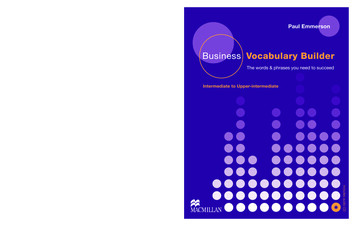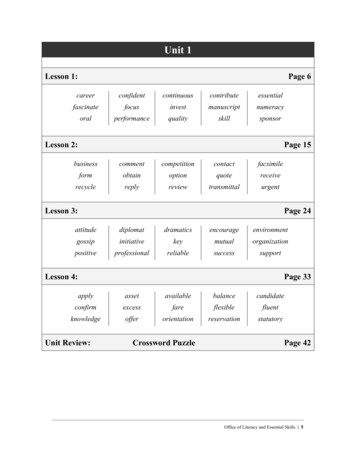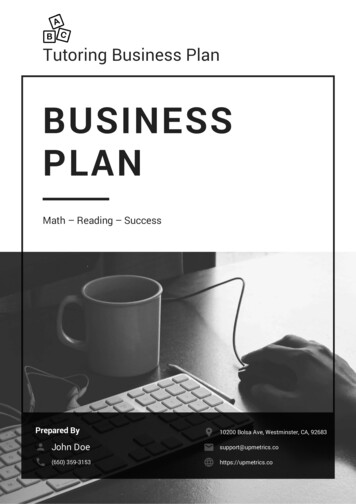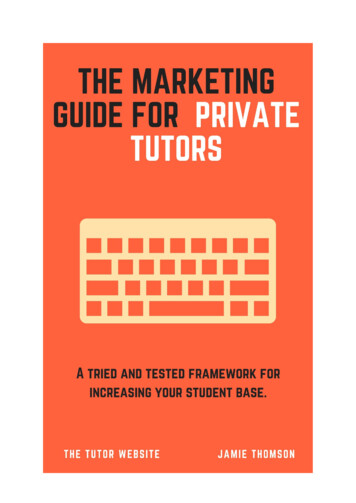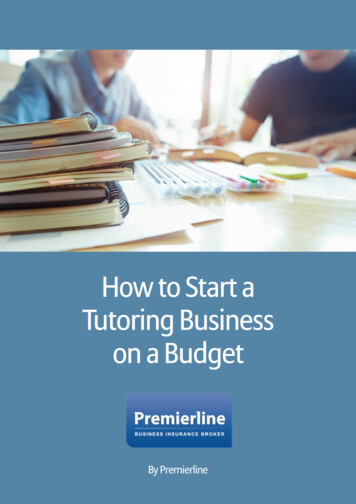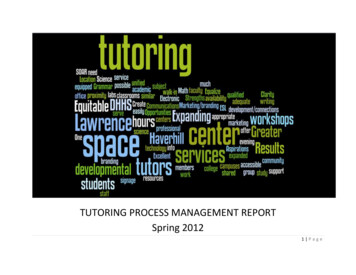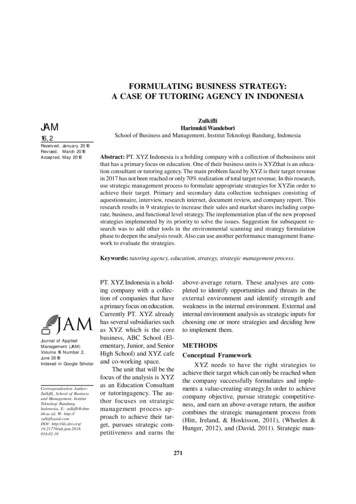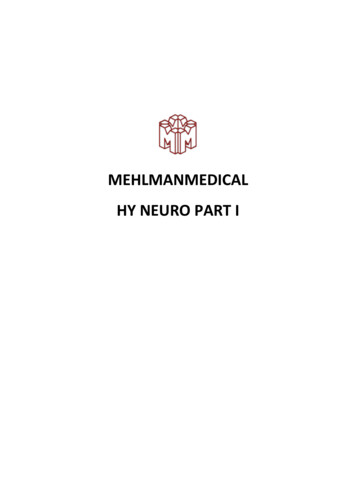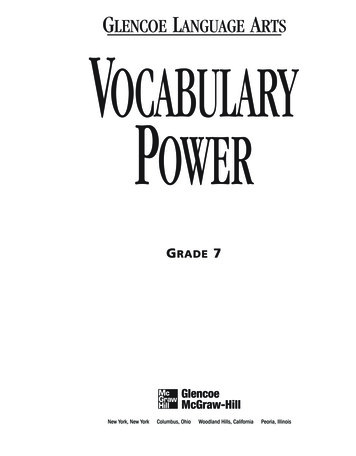
Transcription
GLENCOE LANGUAGE ARTSVOCABULARYPOWERG RADE 7
To the StudentThis Vocabulary Power workbook gives you the practice you need to expand your vocabularyand improve your ability to understand what you read. Each lesson focuses on a singlevocabulary concept or on a theme that ties together the list of words in the Word Bank. Youthen have several opportunities to learn the words by completing exercises on definitions,context clues, and word parts.You can keep track of your own progress and achievement in vocabulary study by usingthe Student Progress Chart, which appears on page v. With your teacher’s help, you can scoreyour work on any lesson or test. After you know your score, use the Scoring Scale on pagesvi–vii to figure your percentage. Then mark your score (or percentage correct) on the StudentProgress Chart. Share your Progress Chart with your parents or guardians as your teacherdirects.Glencoe/McGraw-HillCopyright by The McGraw-Hill Companies, Inc. All rights reserved. Except as permitted under the United StatesCopyright Act of 1976, no part of this publication may be reproduced or distributed in any form or means, orstored in a database or retrieval system, without the prior written permission of the publisher.Send all inquiries to:Glencoe/McGraw-Hill8787 Orion PlaceColumbus, Ohio 43240ISBN 0-07-826226-7Printed in the United States of America2 3 4 5 6 7 8 9 10 024 05 04 03 02
CONTENTSStudent Progress Chart . . . . . . . . . . . . . . . . . . . . . . . . . . . . . . . . . . . . . . . . . . . . . . . . . . . . . . .vScoring Scale . . . . . . . . . . . . . . . . . . . . . . . . . . . . . . . . . . . . . . . . . . . . . . . . . . . . . . . . . . . . . .viUnit 1Lesson 1Lesson 2Lesson 3Lesson 4Lesson 5ReviewTestUsing Synonyms . . . . . . . . . . . . . . . . . . . . . . . . . . . . . . . . . . . . . . . . . . . . . . . .1Multiple-Meaning Words . . . . . . . . . . . . . . . . . . . . . . . . . . . . . . . . . . . . . . . . .3Word Parts . . . . . . . . . . . . . . . . . . . . . . . . . . . . . . . . . . . . . . . . . . . . . . . . . . . .5Word Families . . . . . . . . . . . . . . . . . . . . . . . . . . . . . . . . . . . . . . . . . . . . . . . . .7Using Reference Skills—Using a Dictionary Entry . . . . . . . . . . . . . . . . . . . . . . .9. . . . . . . . . . . . . . . . . . . . . . . . . . . . . . . . . . . . . . . . . . . . . . . . . . . . . . . . . . . .10. . . . . . . . . . . . . . . . . . . . . . . . . . . . . . . . . . . . . . . . . . . . . . . . . . . . . . . . . . . .11Unit 2Lesson 6Lesson 7Lesson 8Lesson 9ReviewTestUsing Synonyms . . . . . . . . . . . . . . . . . . . . . . . . . . . . . . . . . . . . . . . . . . . . . . .13Using Synonyms . . . . . . . . . . . . . . . . . . . . . . . . . . . . . . . . . . . . . . . . . . . . . . .15Prefixes That Mean “not” or “the opposite of” . . . . . . . . . . . . . . . . . . . . . . . .17Using Reading Skills—Learning from Context: Definition . . . . . . . . . . . . . . . .19. . . . . . . . . . . . . . . . . . . . . . . . . . . . . . . . . . . . . . . . . . . . . . . . . . . . . . . . . . . .20. . . . . . . . . . . . . . . . . . . . . . . . . . . . . . . . . . . . . . . . . . . . . . . . . . . . . . . . . . . .21Copyright by The McGraw-Hill Companies, Inc.Unit 3Lesson 10Lesson 11Lesson 12Lesson 13Lesson 14ReviewTestUsing Synonyms . . . . . . . . . . . . . . . . . . . . . . . . . . . . . . . . . . . . . . . . . . . . . . .23Using Synonyms . . . . . . . . . . . . . . . . . . . . . . . . . . . . . . . . . . . . . . . . . . . . . . .25Greek Word Roots . . . . . . . . . . . . . . . . . . . . . . . . . . . . . . . . . . . . . . . . . . . . .27Suffixes That Form Nouns . . . . . . . . . . . . . . . . . . . . . . . . . . . . . . . . . . . . . . .29Using Reference Skills—Using a Thesaurus: Synonyms . . . . . . . . . . . . . . . . .31. . . . . . . . . . . . . . . . . . . . . . . . . . . . . . . . . . . . . . . . . . . . . . . . . . . . . . . . . . . .32. . . . . . . . . . . . . . . . . . . . . . . . . . . . . . . . . . . . . . . . . . . . . . . . . . . . . . . . . . . .33Unit 4Lesson 15Lesson 16Lesson 17Lesson 18ReviewTestWord Usage . . . . . . . . . . . . . . . . . . . . . . . . . . . . . . . . . . . . . . . . . . . . . . . . . .35Using Context Clues . . . . . . . . . . . . . . . . . . . . . . . . . . . . . . . . . . . . . . . . . . . .37Prefixes That Tell When . . . . . . . . . . . . . . . . . . . . . . . . . . . . . . . . . . . . . . . . .39Using Reference Skills—Using a Dictionary: Word Origins . . . . . . . . . . . . . . .41. . . . . . . . . . . . . . . . . . . . . . . . . . . . . . . . . . . . . . . . . . . . . . . . . . . . . . . . . . . .42. . . . . . . . . . . . . . . . . . . . . . . . . . . . . . . . . . . . . . . . . . . . . . . . . . . . . . . . . . . .43Unit 5Lesson 19Lesson 20Lesson 21Lesson 22Lesson 23ReviewTestUsing Context Clues . . . . . . . . . . . . . . . . . . . . . . . . . . . . . . . . . . . . . . . . . . . .45Using Synonyms . . . . . . . . . . . . . . . . . . . . . . . . . . . . . . . . . . . . . . . . . . . . . . .47Latin Word Roots . . . . . . . . . . . . . . . . . . . . . . . . . . . . . . . . . . . . . . . . . . . . . .49Suffixes That Form Adjectives . . . . . . . . . . . . . . . . . . . . . . . . . . . . . . . . . . . . .51Using Reading Skills—Learning from Context: Examples . . . . . . . . . . . . . . . .53. . . . . . . . . . . . . . . . . . . . . . . . . . . . . . . . . . . . . . . . . . . . . . . . . . . . . . . . . . . .54. . . . . . . . . . . . . . . . . . . . . . . . . . . . . . . . . . . . . . . . . . . . . . . . . . . . . . . . . . . .55
Unit 6Lesson 24Lesson 25Lesson 26Lesson 27Lesson 28ReviewTestUsing Synonyms . . . . . . . . . . . . . . . . . . . . . . . . . . . . . . . . . . . . . . . . . . . . . . .57Using Context Clues . . . . . . . . . . . . . . . . . . . . . . . . . . . . . . . . . . . . . . . . . . . .59Using Synonyms . . . . . . . . . . . . . . . . . . . . . . . . . . . . . . . . . . . . . . . . . . . . . . .61Prefixes That Tell Where . . . . . . . . . . . . . . . . . . . . . . . . . . . . . . . . . . . . . . . . .63Using Reading Skills—Using a Dictionary: Multiple-Meaning Words . . . . . . . .65. . . . . . . . . . . . . . . . . . . . . . . . . . . . . . . . . . . . . . . . . . . . . . . . . . . . . . . . . . . .66. . . . . . . . . . . . . . . . . . . . . . . . . . . . . . . . . . . . . . . . . . . . . . . . . . . . . . . . . . . .67Unit 7Lesson 29Lesson 30Lesson 31Lesson 32ReviewTestWord Choices . . . . . . . . . . . . . . . . . . . . . . . . . . . . . . . . . . . . . . . . . . . . . . . . .69Suffixes That Form Verbs . . . . . . . . . . . . . . . . . . . . . . . . . . . . . . . . . . . . . . . .71Compound Words . . . . . . . . . . . . . . . . . . . . . . . . . . . . . . . . . . . . . . . . . . . . .73Using Reading Skills—Learning from Context: Comparison/Contrast . . . . . . .75. . . . . . . . . . . . . . . . . . . . . . . . . . . . . . . . . . . . . . . . . . . . . . . . . . . . . . . . . . . .76. . . . . . . . . . . . . . . . . . . . . . . . . . . . . . . . . . . . . . . . . . . . . . . . . . . . . . . . . . . .77Unit 8Lesson 33Lesson 34Lesson 35Lesson 36ReviewTestUsing Synonyms . . . . . . . . . . . . . . . . . . . . . . . . . . . . . . . . . . . . . . . . . . . . . . .79Homophones and Homographs . . . . . . . . . . . . . . . . . . . . . . . . . . . . . . . . . . .81Borrowed Words . . . . . . . . . . . . . . . . . . . . . . . . . . . . . . . . . . . . . . . . . . . . . .83Using Test-Taking Skills—Analogies . . . . . . . . . . . . . . . . . . . . . . . . . . . . . . . . .85. . . . . . . . . . . . . . . . . . . . . . . . . . . . . . . . . . . . . . . . . . . . . . . . . . . . . . . . . . . .86. . . . . . . . . . . . . . . . . . . . . . . . . . . . . . . . . . . . . . . . . . . . . . . . . . . . . . . . . . . .87Pronunciation Guide . . . . . . . . . . . . . . . . . . . . . . . . . . . . . . . . . . . . . . . . . . . . . . . . . . . . . . . . .89Copyright by The McGraw-Hill Companies, Inc.
STUDENT PROGRESS CHARTFill in the chart below with your scores, using the scoring scale on the next page.Name:LessonUnit ReviewUnit TestCopyright by The McGraw-Hill Companies, abulary PowerGrade 7v
SCORING SCALEUse this scale to find your score. Line up the number of items with the number correct. For example, if 15out of 16 items are correct, the score is 93.7 percent (see grayed area).Number of ItemsNumber 132.92.92.82.72.62.62.5vi Grade .562.560.658.857.155.65452.651.350Vocabulary PowerCopyright by The McGraw-Hill Companies, 8293031323334353637383940
Copyright by The McGraw-Hill Companies, Inc.Number of ItemsNumber 89.587.285Vocabulary Power353637383910097.2 10094.6 97.3 10092.1 94.7 97.3 10089.7 92.3 94.9 97.4 10087.5 90 92.5 95 97.540100Grade 7vii
Name Date Class Lesson 1 Using SynonymsHave you ever thought about what makes you who you are? People are a combination of many different things. The influence of your parents and families plays a big part. So does what you learn in schooland from friends. Beliefs and values are also important. Even your biological make-up has a major role.The words in this lesson can help you explore the different elements that make you who you are.Word fywholeheartedlyerraticpropelEXERCISE ASynonymsSynonyms are words with similar meanings. Each boldfaced vocabulary word below ispaired with a synonym whose meaning you probably know. Think of other words relatedto the synonym and write them on the line provided. Then, look up the word in adictionary and write its meaning.1. manufacture : makeDictionary definition2. wholeheartedly : sincerelyCopyright by The McGraw-Hill Companies, Inc.Dictionary definition3. divulge : revealDictionary definition4. rashly : recklesslyDictionary definition5. propel : pushDictionary definition6. erratic : inconsistentDictionary definition7. specify : stateDictionary definitionVocabulary PowerUnit 1, Lesson 11
Name Date Class continued8. agile : quickDictionary definition9. naive : unsophisticatedDictionary definition10. trivial : unimportantDictionary definitionEXERCISE BSentence CompletionWrite the vocabulary word that best completes the sentence.1. Hayley acted by volunteering for the unspecified task.2. The spider monkeys at the zoo were unbelievably , swinging from branchto branch.3. Please don’t treat my questions as if they are —they’re important to me!4. The workers received bribes to information about the top-secret project.5. The new plant on the edge of town will seat belts for cars.6. I cheered when our neighbor was on the television game show.8. It’s amazing how fast the wind can the sailboat over the lake.9. While their path seemed , the ants knew exactly where they were going.10. How could you be enough to believe that you could buy a computer for 29?2Unit 1, Lesson 1Vocabulary PowerCopyright by The McGraw-Hill Companies, Inc.7. If you don’t which CD you want, you might receive the wrong one.
Name Date Class Lesson 2 Multiple-Meaning WordsIf you’re like most people your age, you probably need more time and input to make decisions aboutyour future. Even if your dreams change and take different shapes, it’s important to keep telling yourself that you can achieve your personal goals if you’re willing to work for them. In this lesson, you’lllearn words related to personal dreams and goals.Word signedburdenexhibitEXERCISE AMultiple-Meaning WordsUse context clues to determine the meaning of the boldfaced word. Then, write thedictionary definition that applies.1. Not wanting to burden her mother further, Sally rode her bike to soccer practice.2. Greg was resigned to helping his father build a shed all weekend.Copyright by The McGraw-Hill Companies, Inc.3. Exhibit A at the trial was a tearstained letter of farewell from the dying wife.4. Lou felt only apathy toward the student proposal about fees.5. Phil the Groundhog had to emerge from his hole before the witnesses could declare an early spring.6. We studied motive energy in physics class last month.7. Courtiers had to comply with court protocol when they had an audience with King George.Vocabulary PowerUnit 1, Lesson 23
Name Date Class continued8. The loan officer told me that I need to have an asset to use as collateral for a loan.9. James was reprimanded because he neglected to salute his superior officer.10. The giant panda at our zoo is exotic—it’s native to China!EXERCISE BQuestions and AnswersAnswer each question based on your understanding of the boldfaced word.1. What do you feel is the best way to get people to comply with antilittering laws?2. What actions might you take if you are feeling neglected by your friends?3. What do you feel is your strongest asset as a member of a class committee?4. Describe an exotic place you would like to visit and explain why you would like to visit it.6. Describe the mood of the movie audience at the moment when the monster is about to emergefrom the darkness.7. Describe a time when you felt resigned to a situation.8. What might be someone’s motive for doing volunteer work?4Unit 1, Lesson 2Vocabulary PowerCopyright by The McGraw-Hill Companies, Inc.5. Is student apathy a problem at your school? Why or why not?
Name Date Class Lesson 3 Word PartsWords can be made up of different parts. The main meaning of a word is contained in its root or baseword. Base words are roots that are complete words. Prefixes can be added to the beginning of a rootand suffixes at the end to change the word’s meaning. Knowing the meanings of word roots, prefixes,and suffixes can help you make an educated guess about the meaning of a new word. Sometimes,however, the exact meaning of the new word isn’t clear from the root. It’s always safer to look up newwords in a dictionary. In this lesson, you’ll identify some common roots, prefixes, and suffixes andlearn how they work together to give meaning to words.Word ssentprovidencevisibleconsentinaudibleEXERCISE AContext CluesRead the clues and answer each question.1. Vis, vid is a Latin root meaning “to see.” If the prefix pro-, meaning “before” or “forward,” is addedto this root, what might be the meaning of the word provide?Copyright by The McGraw-Hill Companies, Inc.2. Adding the suffix -ence, which makes words into nouns, creates providence, a word that means what?3. The suffix -ible is used to create adjectives from roots. How would you describe something thatis visible?4. The Latin root aud, audi means “to hear.” The suffix -tory is used to make adjectives. Which partof your body contains its auditory sense?5. The Latin suffix -ium describes rooms or buildings. What kinds of activities go on in anauditorium?6. The prefix in- is one of many that means “not” or “the opposite of.” What are some things thatyou might describe as inaudible?7. A Latin root meaning “to feel” is sens/sent. Con- is a prefix that means “with.” If you consent tosomething, what might you be doing?Vocabulary PowerUnit 1, Lesson 35
Name Date Class continued8. The prefix dis- is another “not” prefix. If you dissent, how do you feel about a suggestion?9. Adding the noun suffix -ion to dissent creates the noun dissension, which probably means what?10. A suffix that is used to create verbs is -ize. If you sensitize others to your situation, how wouldthey feel?EXERCISE BDefining WordsCheck your definitions by looking up each word in a dictionary. Write the meaning. Howclose did you come to the correct meaning?1. provide2. providence3. visible4. auditory5. auditorium6. inaudible7. consent9. dissension10. sensitizeEXERCISE CWord WebsOn another sheet of paper, make three copies of the word web on this page. Using wordparts you learned about in this lesson, write a word root in the first web, a prefix in thesecond web, and a suffix in the third web. Then, fill in the “rays” with as many words asyou can that contain that root, prefix, or suffix. Exchange webs with a partner and discussthe meanings of the words you have listed.6Unit 1, Lesson 3Vocabulary PowerCopyright by The McGraw-Hill Companies, Inc.8. dissent
Name Date Class Lesson 4 Word FamiliesWord families are groups of words that contain the same roots or base words. The root or base wordgives a word its main meaning. In this lesson, you’ll learn about words in the same word families.Word ionportablescribbledictatorpaternalEXERCISE ADictionary DefinitionsLook up each word in a dictionary and write its meaning. Use the information in thedictionary entry to underline the root or base word.1. portable2. deport3. paternal4. patriotic5. scribbleCopyright by The McGraw-Hill Companies, Inc.6. inscription7. prescribe8. dictate9. diction10. dictatorEXERCISE BSentence CompletionWrite the vocabulary word that best completes the sentence.1. If you your speech, I will type it for you.2. When the storm knocked out our power last summer, we had to borrow my uncle’selectric generator.3. The football player decided to his autograph quickly on the napkin.4. Tabitha’s grandmother was an underwater explorer and scientist.Vocabulary PowerUnit 1, Lesson 47
Name Date Class continued5. The doctor decided to a painkiller for Marcie’s sprained ankle.6. The speaker was quite easy to understand because his was perfect.7. According to my grandfather, it is every person’s duty to join the armedforces and fight for the nation.8. People marched in the streets in protest when the president seized complete control of thecountry and became a .9. The on the ancient tombstone was worn and hard to read.10. The judge was forced to the foreign workers since they were in thecountry illegally.EXERCISE CUsageAnswer each question based on your understanding of the boldfaced word.1. Who can prescribe drugs for you if you are sick?2. Which item is most easily portable—a watch, a canoe, or a pony?Copyright by The McGraw-Hill Companies, Inc.3. Why is it important to pay attention to your diction when you are giving a speech?4. What inscription might you add to the base of a statue of your hero?5. Do you think it’s important to feel patriotic? Why or why not?8Unit 1, Lesson 4Vocabulary Power
Name Date Class Lesson 5 Using Reference SkillsUsing a Dictionary EntryYou already know that a dictionary is a valuable source of definitions. The words defined in a dictionaryare called entries. Look at the sample entry below.GuidewordsPronunciation spellingindependent/indicatorindicate (in’ d kāt’) v. 1. to point out or point to: I will indicate when we should leave.2. to be a sign of: The red spots on his skin indicate measles. 3. to demonstratethe necessity of: The crowded conditions indicate the need for a new school building.4. suggest, state briefly: I indicate agreement by nodding my head.eEntryDefinition(s)Sample phrase or sentenceEXERCISEUse the sample entry to answer each question.1. Which entry would you find on this page, indefinite, index, or individual?2. Which meaning of indicate is being used in the following sentence?The darkening clouds indicated the storm’s approach.Copyright by The McGraw-Hill Companies, Inc.3. On which syllable does the major accent fall in the word indicate?4. Use the third meaning of indicate in a sentence of your own.5. Use the fourth meaning of indicate in a sentence of your own.6. What guidewords might be on the pages before and after the page of this entry?beforeafter7. Use the second meaning of indicate in a sentence of your own.Vocabulary PowerUnit 1, Lesson 59
Name Date Class Review: Unit 1EXERCISECircle the word in parentheses that best completes each sentence.1. We started a poster campaign to get students involved in school issues and to fight (apathy,burden, providence).2. As the sun rose, the dark outline of the mountain peak slowly became (patriotic, erratic, visible).3. It’s best not to get upset about (paternal, inaudible, trivial) or unimportant matters.4. The brightly colored birds are from (naive, portable, exotic) locations around the world.5. The explorer read the strange (inscription, asset, motive) on the ancient treasure chest withgrowing excitement.6. Paul promised not to (divulge, consent, prescribe) the secret I whispered to him.7. Because he was almost fifteen years older than his younger brother, Mark’s feelings for Michaelwere more (naive, paternal, trivial) than brotherly.8. The crowded conditions and harsh rules in the prison caused feelings of (dictator, diction,dissension) among the prisoners.Copyright by The McGraw-Hill Companies, Inc.9. You have to be (exotic, agile, patriotic) to complete the obstacle course.10. We must find a way to make drivers (comply, dissent, propel) with the speed limit.10Unit 1 ReviewVocabulary Power
Name Date Class Test: Unit 1PART ACircle the letter of the word that best completes the sentence.1. The police wondered about the man’s for committing the crime.a. apathyb. motivec. providenced. diction2. You’ll have to improve your if you want people to understand what you are saying.a. dictionb. burdenc. assetd. exhibit3. Only a person would tell a stranger his credit card number.a. paternalb. naivec. portabled. visible4. The pilgrims gave thanks to for their plentiful harvest.a. his dictatorb. the inscriptionc. providenced. the burden5. The photographers waited for the groundhog to from his hole.a. deportb. propelc. provided. emerge6. I hope the doctor can something strong for this toothache!a. prescribeb. divulgec. exhibitd. dissentCopyright by The McGraw-Hill Companies, Inc.7. Because she couldn’t change the judge’s decision, Shelley became to it.a. divulgedb. prescribedc. resignedd. neglected8. I’ll write down the message if you it slowly and clearly for me.a. propelb. dictatec. complyd. exhibit9. Have you decided which seashells to in the showcase?a. consentb. divulgec. deportd. exhibit10. The company president explained that the new factory would compact discs.a. dictateb. exhibitc. propeld. manufacture11. I could see the stage all right, but the quality was poor.a. exoticb. auditoryc. paternald. agile12. Taking class notes for you while your broken arm heals won’t be a at all.a. burdenb. dictionc. dissensiond. providence13. While most club members agreed with the decision, I expect Ricky to forcibly.a. consentb. complyc. dissentd. scribbleVocabulary PowerUnit 1 Test 11
Name Date Class continued14. The congresswoman pounded the table and stated that she would never to raising taxesfor the poorest taxpayers.a. consentb. dissentc. dictated. prescribe15. Will made all the decisions for the chess club like a(n) , without asking anyone else’s opinion.a. burdenb. dictatorc. assetd. exhibit16. If you carelessly the instructions, there’s a good chance someone will misunderstand them.a. propelb. manufacturec. scribbled. deport17. Think about your answer for a while instead of answering .a. with a scribble b. wholeheartedly c. with a motived. rashly18. Because the criminal was a citizen of another country, the judge decided to him insteadof sentencing him to jail.a. divulgeb. deportc. specifyd. prescribe19. Doing volunteer work at the animal shelter will certainly you to the problem of too manystray dogs and cats.a. exhibitb. dictatec. sensitized. divulge20. Be sure to that you want the peaches with the red centers.a. specifyb. exhibitc. dictated. deportPART B1. What propels a sailboat through the water?a. the waterb. the captainc. the rudderd. the wind2. Toward what would a person have patriotic feelings?a. a baseball team b. a countryc. a petd. a beverage3. What activity would not take place in an auditorium?a. a rehearsalb. a concertc. a playd. a swimming meetCopyright by The McGraw-Hill Companies, Inc.Circle the letter of the expression that best answers the question.4. If you are in agreement with a proposal, you would express your .a. assetb. dissentc. consentd. inscription5. How would you describe having a reputation as an honest person?a. an assetb. a burdenc. a motived. an exhibit12Unit 1 TestVocabulary Power
Name Date Class Lesson 6 Using SynonymsChange is always at work. Some changes are easy to identify, like changes in the weather or the seasons. Other changes are harder to recognize, like the changes in the way you experience the worldaround you. This lesson presents some words that can be useful in talking about change.Word culationvaryconvictionpassiveEXERCISE ASynonymsEach boldfaced word below is paired with a synonym whose meaning you probably know.Think of other words related to the synonym and write your ideas on the line provided.Then, look up the word in a dictionary and write its definition.1. bewildered : confusedDictionary definition2. speculation : thinking about somethingDictionary definitionCopyright by The McGraw-Hill Companies, Inc.3. conviction : beliefDictionary definition4. obsessed :
vocabulary concept or on a theme that ties together the list of words in the Word Bank. You then have several opportunities to learn the words by completing exercises on definitions, context clues, and word parts. You can keep track of your own progress and achievement in vocabulary study
